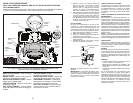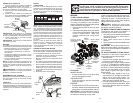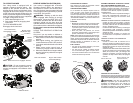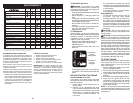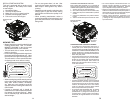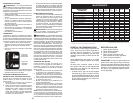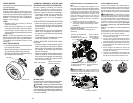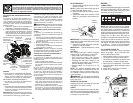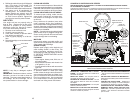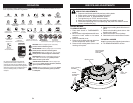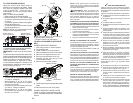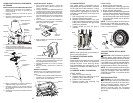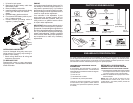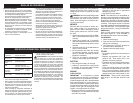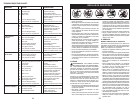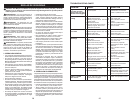
18
MUFFLER
Inspect and replace corroded muffler and
spark arrester (if equipped) as it could create
a fire hazard and/or dam age.
SPARK PLUG(S)
Replace spark plug(s) at the beginning of
each mowing season or after every 100
hours of operation, whichever occurs first.
Spark plug type and gap setting are shown
in “PROD UCT SPEC I FI CA TIONS” section
of this manual.
CLEANING
• Clean engine, battery, seat, finish, etc. of
all foreign matter.
• Keep finished surfaces and wheels free
of all gasoline, oil, etc.
• Protect painted surfaces with au to mo tive
type wax.
We do not recommend using a garden hose
or pressure washer to clean your riding
mower unless the engine and transmission
are covered to keep water out. Water in en-
gine or transmission will shorten the useful
life of your riding mower. Use compressed
air or a leaf blower to remove grass, leaves
and trash from riding mower and mower.
CLEAN AIR INTAKE/COOL ING AREAS
To ensure proper cooling, make sure the
grass screen, cooling fins, and other exter-
nal surfaces of the engine are kept clean
at all times.
Every 100 hours of operation (more often
under extremely dusty, dirty conditions),
remove the blower housing and other cooling
shrouds. Clean the cooling fins and external
surfaces as necessary. Make sure the cooling
shrouds are re in stalled.
NOTE: Operating the engine with a blocked
grass screen, dirty or plugged cooling fins,
and/or cooling shrouds re moved will cause
engine damage due to overheating.
CLEAN AIR SCREEN
Air screen must be kept free of dirt and chaff
to prevent engine dam age from overheating.
Clean with a wire brush or compressed air to
re move dirt and stub born dried gum fibers.
AIR FILTER
Your engine will not run properly using a
dirty air filter. Replace the air filter every
100 hours of operation or every season,
whichever occurs first. Service air cleaner
more often under dusty conditions.
1. Remove cover knob and cover.
2. Carefully remove cartridge.
3. Clean base carefully to prevent debris
from falling into carburetor.
4. Clean by gently tapping on a flat sur-
face.
5. Re in stall cartridge, cover and secure with
cover knob.
NOTE: If very dirty or damaged, replace
cartridge.
IMPORTANT: Petroleum solvents, such as
kerosene, are not to be used to clean the
cartridge. They may cause de te ri o ra tion of
the cartridge. Do not oil cartridge. Do not
use pressurized air to clean cartridge.
Cover Knob
Air Filter
Cover
4. Refill engine with oil through oil fill dipstick
tube. Pour slowly. Do not overfill. For
approximate capacity see “PRODUCT
SPEC I FI CA TIONS” section of this man u al.
5. Use gauge on oil fill cap/dipstick for
checking level. For accurate reading,
tighten dipstick cap securely onto the
tube before removing dipstick. Keep oil
at “FULL” line on dipstick. Tighten cap
onto the tube securely when finished.
35
CONOZCA SU CORTADORA DE CÉSPED
LEA ESTE MANUAL DE OPERARIO Y LAS REGLAS DE SEGURIDAD ANTES DE OPERAR
SU CORTADORA DE CÉSPED
Compare las ilustraciones con su cortadora de césped para familiarizarse con las ubicaciones de los
diferentes controles y a just es. Conserve este manual para futuras consultas.
Nuestra cortadora de césped cumple con las normas de seguridad aplicables del
Instituto Nacional Estadounidense de Norm as.
PALACA DEL EMBRAGUE DE LA PLATA-
FORMA - Se usa para activar la cuchilla de la
cortadora de césped.
PEDAL DEL FRENO - Se usa para fre nar la
cortadora de césped y arrancar el motor.
PALANCA DE AJUSTE DE ALTURA - Se usa
para ajustar la altura de corte de la cortadora
de césped.
INTERRUPTOR DE ARRANQUE - Se usa para
arrancar y detener el motor.
ÉMBOLO DE LA PALANCA DEL ELEVADOR -
Se usa para sol tar la palanca de ajuste de altura
cuando se cam bia su posición.
PALANCA DE FRENO DE ESTACIONAMIENTO
- Fija el freno de estacionamiento en la posición
de freno.
PALANCA DE CONTROL DE MOVIMIENTO -
Selecciona la velocidad y dirección de la cortadora
de césped.
CONTROL DE RUEDA LIBRE - Desactiva la
transmisión para empujar o remolcar despacio
la cortadora de césped con el motor apagado.
INTERRUPTOR DEL SISTEMA DE FUNCIO-
NAMIENTO HACIA ATRÁS (ROS) EN POSI-
CIÓN “ON” - Permite la operación del conjunto
segador o otro accesorio accionado mientras
que en revés.
Interruptor de
arranque
Palanca de
control de
movimiento
Émbolo de la
palanca del
elevador
Control de
rueda libre
Palanca de
ajuste de
altura
Palanca del
embrague de la
plataforma
Pedal del freno
Pedal del freno de
estacionamiento
(ROS) en
posición “on”



